
Eden McCall, wearing her typical packable North Face jacket, is ordering a coffee at Espresso Roma. “Hang on one second,” she says. “This is the perfect opportunity.”
She pulls out markers and a stack of postcard-sized maps of the University of Oregon campus. She’s had them in her backpack for weeks, ready to hand out to anyone in her sights. She gives some to the cashier and asks him to draw his interpretation of campus — where he likes to walk, memorable spots, hidden gems — onto the map.
It’s one of the many original interpretive mapping projects she’s created with the UO’s InfoGraphics Lab.
It may surprise many that McCall — a senior journalism and spatial data science major who is dual-enrolled in the UO’s School of Journalism and Communication (SOJC) and Clark Honors College and pursuing a minor in science communication — is an introvert, as she often pulls strangers from off the street or takes them away from their laptops with a casual, “Can I bother you for a second?”
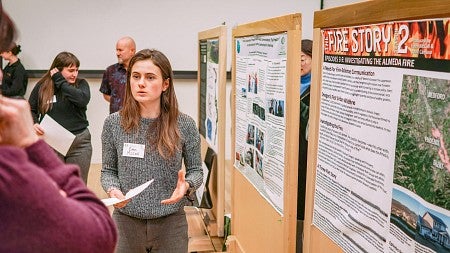
The skill of being a “fake extrovert” is one of many she’s learned through her life experience and the opportunities she’s received through the SOJC.
Despite a newfound comfort in reaching out, she still likes to stay in the background. She doesn’t fill out her own maps, for example. “I make the map or the base map so other people can fill it,” she says. “I'm a medium for the things I'm working on.”
With a passion for science and communication — especially when they mix — McCall is always looking for chances to get out of her comfort zone. Sometimes that looks like scuba diving in Thailand or making a podcast about wildfires or filming the marathon in Eugene. Whatever the opportunity looks like, McCall welcomes its challenges and lessons with open arms.
McCall grew up in Salem, Oregon, with her parents, older brother and two border collies, Ren and Jax. Her younger years were spent training Ren and Jax for agility, teaching them how to speak, jump and spin. It was McCall’s first understanding of the intricacies of communication. “The twist of your shoulders, the pause in your acceleration or deceleration, all of that communicates,” she says.
And at a young age, her bond with her pets was so strong, she feels almost like she “connected with animals before people.”
Instilling curiosity and a taste for adventure
McCall’s first taste of science came from playing in the creek behind her house. She spent summers watching crawdads, building forts and making dams, although she probably “shouldn't (have been) changing the water hydrology,” she says.
While McCall’s curiosity for nature was increasing, she and her family were exploring every corner of the globe, from Mexico to China. Her mom, Debbie McCall, says the point of traveling was to give her children the opportunity to “be with real people and really get the experience of how they lived.”
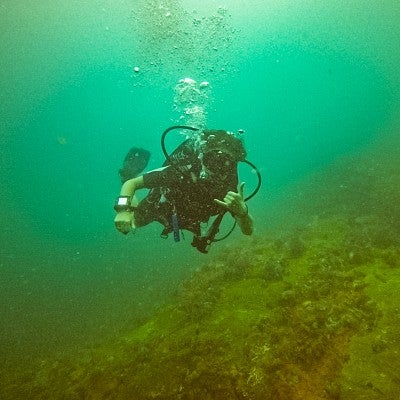
Most families may choose to go to a hotel, sit on a lawn chair and tan on vacation. But Debbie McCall says there’s something much more valuable in “being able to have an adventure every day,” like eating fresh piranha or snorkeling with sharks.
One trip in particular, a weeklong jaunt to Belize, pushed McCall’s limits and challenged her adaptability and tolerance. At only 10 years old, McCall stayed with her family in a hut in the tropics with no electricity or running water. “You stuffed toilet paper up your nose and then you couldn’t smell the sulfuric showers that were ice cold,” McCall remembers. And, of course, she says, “the toilets had crabs in them.”
The trip wasn’t easy, but it may have had a significant impact on McCall’s present and future, Debbie McCall says. “I do think it was impactful and has changed the trajectory of her life, what she chooses to do with her free time and her professional career.”
Seeking discomfort and failure
While she was always curious growing up, McCall was also shy. She was the kid hiding behind her parents’ legs, sitting at the back of class. She says it stemmed from being scared of failing or not living up to her potential. But at some point, it started holding her back, and she wanted to change.
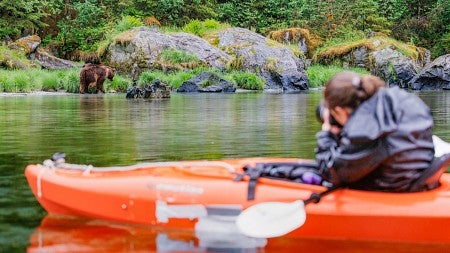
“I started to reflect on it in high school, and kind of adopted this mental mindset of ‘seek discomfort,’” she says. “It's more about what I'm doing and the impact that’s having.” In other words, when she’s uncomfortable, she knows she’s pushing a boundary that will lead to discovery. “That's better because then it’s leading to a (greater) impact.”
So she forced herself to join speech and debate. “I wanted to be able to speak with people and articulate my thoughts,” she says. After four years in the club, McCall became comfortable with public speaking and broad communication.
High school is also where McCall discovered documentary filmmaking. She entered a competition with a documentary on transportation and infrastructure failures while exploring a narrative form of impactful storytelling.
“Impact” is a keyword in McCall’s vocabulary these days, as some of her most recent projects through the SOJC have been about wildlife conservation, wildfires and Alaskan indigeneity.
Discovering the connection between spatial mapping and wonder
Professor of Practice Torsten Kjellstrand, McCall’s thesis advisor, remembers meeting her as she entered his Science Story class when she was only a sophomore. “This is maybe something you ought to wait a year to do,” Kjellstrand remembers telling her.
“No,” she replied. “I want to do it now.”
From day one, McCall was a “rockstar,” Kjellstrand says, never to be underestimated again.
As Kjellstrand watched McCall participate in the class, he says there was a moment where he could see all the little pieces of McCall’s many interests coming together. Her passion for science and climate awareness combined with a broad range of multimedia skills led her to pursue science communication.
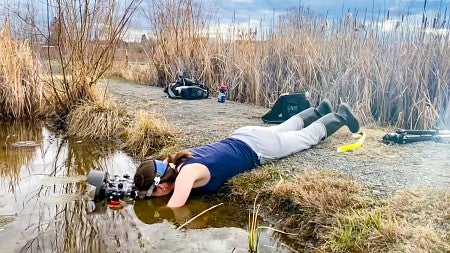
Between her sophomore and junior year at UO, Eden took a gap year to do a four-month internship with a conservation organization based on the Osa Peninsula of Costa Rica. It was physically uncomfortable at times, with moldy mattresses, cockroaches, long work hours and walks through pouring rain. But it taught her that “the activities and the people in a space are what make the place,” she says, “more so than the actual physical space.”
A year later, McCall discovered another piece to add to the mix. After hearing about the InfoGraphics Lab in classes, she decided to join. For two years, she has created and collaborated on spatial mapping projects that “encourage people to have wonder and awe about the world, and be curious about other people.”
It’s been one of the most fulfilling things McCall has been involved with on campus, she says. “(It) lets me explore different ways of interacting with people, which I’m now trying to work into my multimedia stories and feature work.” And she’s using the mapping skills she’s learned in her final assignment for the university.
In her honors thesis, McCall has been observing the conservation effort of the threatened Oregon spotted frog, with the hope of “finding a way to use media and the lens and my ability to go over there and photograph the frogs and talk to people and channel that into a way that conveys the way the frog is connected to (the environment).”
Hopping into the world of a threatened frog
One day, as McCall was reading through the Bend Bulletin, she stumbled across an article about a lawsuit over a threatened frog. It sparked her interest and, as she read more about it, she became more and more curious about the frog.
Kjellstrand says he was initially confused that she had chosen such a small, seemingly unimportant and uninteresting animal as her focus for a thesis on climate change. “It's not even a warm and fuzzy threatened species,” he remembers thinking. But, eventually, he realized the frog was much more symbolic than it seemed.
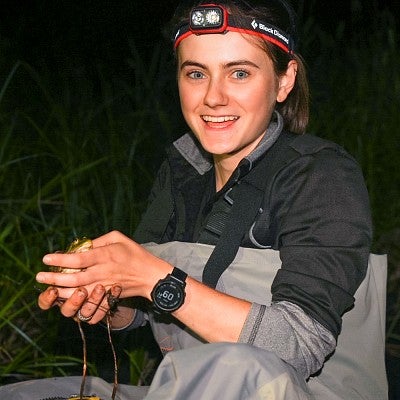
The frog, which used to live in areas along the Cascade Range, became threatened due to the construction of dams, which changed the way rivers and streams flow across the land. Now the frog survives in Bend, where community conservation efforts are helping it survive.
“It was the perfect mechanism for talking about our relationship with the land here in western Oregon,” Kjellstrand says. “The way to save the species was not to leave the landscape alone, but it had to be human intervention. It took as much human intervention to preserve this critter as it took to threaten it.”
For McCall, the frog is also a perfect way to localize nature. Just as she played in the creek as a kid, she wants people to realize, “There’s nature in our own backyards. If you take a second to peer into the pond and hear the sound they make, you can find it.”
Now McCall is putting final touches on her thesis as she prepares to graduate with two majors, a minor, a Clark Honors College diploma and the coveted Janice E. Rianda Outstanding Student Award, for earning the highest GPA of her class — 4.16.
So what’s next? In December, she’s going backpacking in Africa with a friend for four months. But after that, McCall says, she’s not totally sure what she’ll do.
She knows she wants her work to be dynamic, collaborating with different people on different projects. She knows she doesn’t just want to write. She’s also keeping options open for doing grant-funded projects or freelance work. For McCall, it’s about being able to continue the curiosity and sense of adventure she’s had since she was a kid.
Kjellstrand says McCall’s versatility means she doesn’t have a set path for the future. But that won’t deter McCall. “If she needs to walk through a swamp for six miles, she'll walk through the swamp for six miles,” he says. “If she needs to climb a mountain, she'll climb a mountain.”
—Julia Boboc, class of ’26
Julia Boboc is a second-year journalism major in the UO School of Journalism and Communication’s direct-admit program and a member of Clark Honors College. She especially enjoys interviewing and writing about people and feels everyone has a story to tell. She loves trying new things in journalism and taking on cool projects. She also produces a podcast, “How It’s Reported,” for the Daily Emerald.
